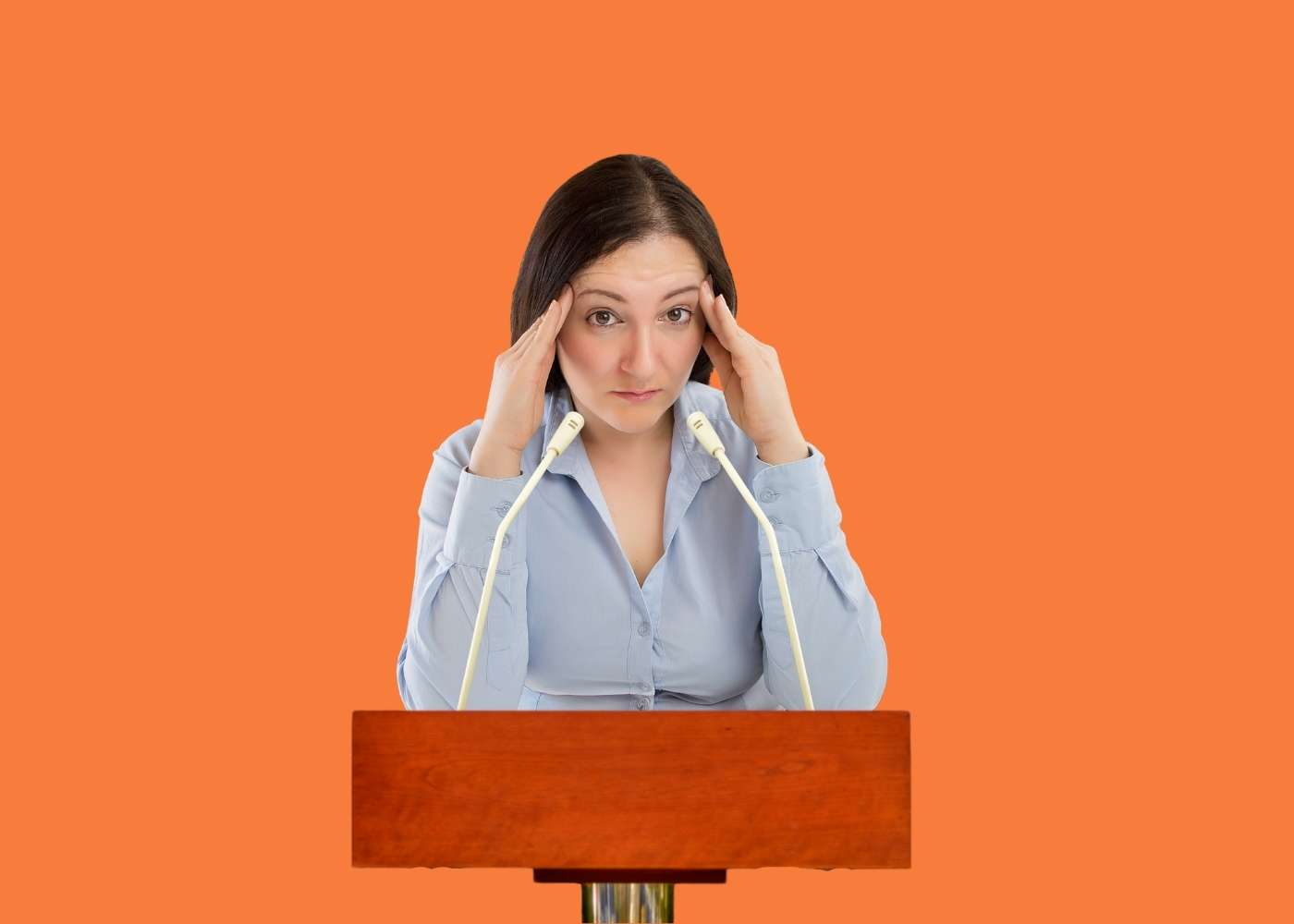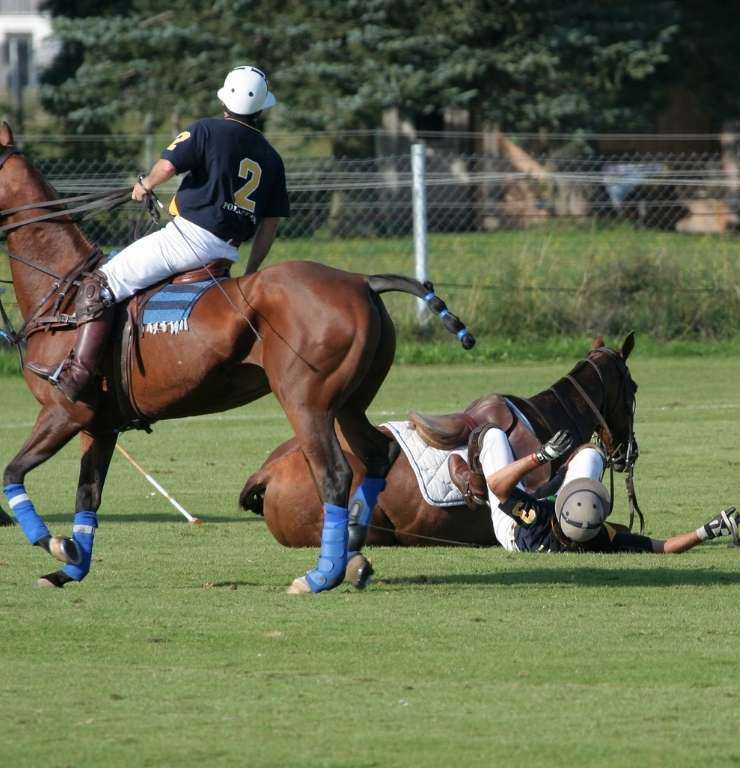
You don’t get rid of fright, You manage it!
Recently my colleague Tina Larsson asked how to get rid of stage fright. My answer is you don’t get rid of it, but you learn how to manage it. Here are some tips for wrangling that energy to your benefit:
- Be prepared. That’s going to do the most for your confidence. Knowing how to prepare is something I find most people are fuzzy on, so I’ll delve into that another day.
- Limit your caffeine and sugar intake on the day you present, so you don’t get an adrenaline spike mixing with a sugar spike.
- Visualize yourself delivering your message: strong, confident & having fun.
- Have a mantra at hand (in mind), to inspire you to a better performance.
- Drink plenty of water, which is the speaker’s drink of choice. Not carbonated or cold water though, cold chills your voice cords which can send your pitch up.

Managing Stage Fright
Plenty of people, myself included, have experienced fear before getting in front of an audience.
“You manage your emotions or your emotions will manage you.” John Wooden.
“You manage your stage fright, or your stage fright will manage you.” Katie Karlovitz.
It’s normal and it’s also manageable. The first thing is to accept and expect that you’re going to have some respiratory changes- quickening heart rate, dry mouth, slight shaking etc. Here’s what you do:
- Get your breath under control with deep breaths from the diaphragm; once that’s under control the rest of your body will start to settle down and relax.
- Sip room temp water to stay hydrated; ice water only makes your vocal chords constrict and makes your pitch go up.
- Limit your caffeine so it’s not mixing in with your adrenaline and causing energy spikes.
- I’ve experimented with Bach Rescue Remedies, herbal teas and also visualizations.
- DO NOT drink alcohol or take sedatives to blunt the nerves as they will affect your motor control and send the wrong message.
There’s nothing worse than the terror of being in front of an audience and feeling helpless and out of control. Stress tests have clinically shown that the fear of going on stage equals the fear of going into battle, which explains the “fight or flight” response that so often kicks in before giving a speech. It’s time to confront this head on, because too many good people are being silent when they should be speaking up.

Taken a Tumble Lately? Webinar Disaster Update.
Taken a tumble in life lately? Did it hurt or scare you? Most important, what did you do after you fell? How did you process the experience, and what did you learn? Did the pain ease, or is it still there?
When I confronted my techno-phobia a few weeks ago, and managed to scare myself even more than I’d ever thought possible (I was sweating gum drops!) I was able to get through it, calm down and keep my wits about me. However, it took a hefty chunk out of my central nervous system. I hadn’t really conquered my fear, merely confronted it.

All equestrians know that if you fall off your horse, you get up and re-mount immediately. If you don’t, the fear of falling can take hold and grow, and by the way, it hurts. With this in mind, I scheduled another webinar for the following week. It had to be done quickly, before I had too much time to think about it.
Webinars are a breed apart, when it comes to the many different ways to communicate our business messages. I’ve worked across all platforms and to host webinars or conduct online courses, and do them well, takes a combination of skill sets that humbles me. So I practiced a lot, and got familiar with the control panel for Go-to-Webinar; I wanted to fly solo for this one.
You know what? It was just fine…smooth execution, relaxed focus and able to be both “in the zone” but also have an eye on the panel that showed questions, raised hands, how much time I had left etc. I had control now, where I’d felt out of control before, and it was as exhilarating as it was empowering.
Moral of the story: “Don’t let your fears make you foolish.”

I Had a Panic Attack Before My Webinar on Stage Fright…Here’s How I Survived.
Oh, the irony! I decided to confront my fear of tech issues by hosting a webinar on public speaking, including how to be interesting and managing stage fright. I know that fear holds a lot of us back-in different ways of course, but it’s always getting in the way and never really helps a situation.
My wing man was in place, to help me manage the tech end. The platform was Go-To-Webinar, and I made sure to get in and do some rehearsals on my own, before a 4 pm start. That’s when I got myself into trouble. I started clicking things within G-T-W, and somehow locked myself out of my account, at 3:55pm.
So you know what I did? I panicked. I couldn’t think, or read the prompts on the screen, or even breathe. The very thing I’d been afraid of was happening and I was helpless. My wing man emailed me, saying he was locked out. My mentor called on the phone, to ask what was going on. All I could do was email back, “I am dying.”

Because that’s what it felt like. The wave of anxiety was…huge! When I finally got in, it was 4:09. My voice was shaking, and so were my hands, but I was in. I hit the record button and let everyone know the truth…that I was agitated and uncomfortable. Then I followed my own advice, by getting my breathing under control. Slowed it down, settled deeper into my chair, and regained control of my wits. Because I’d prepared the presentation, I was able to more or less follow my prep, with a few detours.
When it ended, I heard from some people right away, saying nice things. I couldn’t believe them until I watched playback (nerve-wracking) but it turns out that most of my nerves really don’t come across, which is what I’m always telling my speakers. The internal experience of stage nerves is always much more acute than what the audience perceives.
My husband wanted me to edit out my first few minutes of the webinar, because he thinks it makes me seem weak. I completely disagreed, and posted it on YouTube, precisely so people can see that we ALL have our moments that challenge and scare us. Just go with them, don’t fight, and keep breathing. You’ll be just fine.

Drinking and Speaking in Public.
Last night at a networking dinner, I was gratified to see that the keynote speaker made a point of waiting until after her speech to have a glass of wine, even as the rest of the room was cheerfully imbibing. As a physician, she clearly knew how alcohol affects motor control, and wisely opted to wait.
Still, I get asked the question fairly often- “Is it OK if I have a drink (or tranquilizer) to help me with stage fright?” My answer is two-fold:
- There are better, more effective ways of managing your anxiety. The first is to prepare thoroughly, including rehearsing and timing yourself. That alone will give you a sense of accomplishment and ownership.
- Herbal teas, Valerian root, Bach Rescue Remedies…I’ve tried them and found them to have a nice soothing quality (yes, I get stage nerves too.)
- But sometimes, some backup is useful. One client had an r/x for a beta-blocker, which is a drug that works to keep the heart rate steady. He asked if he could take it, and I told him that I’d rather him have it on him, and not need it, than to not have it at all. He ended up taking it one time, and then never needed it again.

Drinking is just not a good way to prepare for speaking in public. Your speech, your reflexes and your mental acuity all get involved. Is this how you want your audience to see you?
Let them see you shining your light, in all its undiminished strength and glory…then you can have a victory glass of wine!

Stage Fright.
“You manage your emotions or your emotions will manage you.” Basketball coach John Wooden
“You manage your stage fright or your stage fright will manage you.” Public Speaking coach Katie Karlovitz
There’s nothing worse than the terror of being in front of an audience and feeling helpless and out of control. Stress tests have clinically shown that the fear of going on stage equals the fear of going into battle, which explains the “fight or flight” response that so often kicks in before giving a speech. It’s time to confront this head on, because too many good people are being silent when they should be speaking up.

The first thing to understand is that this fear is a type of energy…nothing more or less. Einstein said “All is energy” and he was right. Unfortunately, many people are obsessing over the very thing they wish to avoid, which is a holy terror at being under the spotlight. But the law of attraction dictates that public speaking hell is exactly where they’re heading because that’s where their thoughts lead them.
So the challenge lies in handling the strong physical, mental, and emotional components that are acting on us; by harnessing the energy of fear we can re-direct it and point it squarely at what we want to happen, in this case, giving a confident delivery. Here are the antidotes to the toxic forces in play:
- Physical- the first, best defense is to get your breath under control. Once you do that, the rest of the body has no choice but to follow along. When we’re scared, our breathing becomes shallow, short and gulping for air. By slowing it down, we are able to manage it. Drop down into deep breaths from the diaphragm, inhaling on a slow count of five, holding that breath for five, and then releasing on a slow, controlled count of five. Repeat until you feel grounded and calm.
- Limit your caffeine on days that you’ll be presenting-you don’t need it on top of the adrenaline you’ll be releasing into your bloodstream. Same with sugar…you don’t want anything to be spiking your levels.
- Your mental game needs to be strong-this isn’t the time to allow stray thoughts in, because they can too easily be negative or judgmental and this will only get in your way. Stay firmly focused on your message, whatever it is that you believe is imperative to tell your audience. You can’t tell them everything you know, so make every point matter, stay in the moment and don’t get ahead of yourself.
- Emotional support is another key to handling yourself. Create a mantra that perfectly captures the results you’re aiming for. “I am cool, collected and confident.” “My message and my integrity are clear.” Try assuming an avatar that embodies the qualities you admire…it’s role play and can be effective and fun, too.
Coach Wooden got such spectacular results from his players because he knew how to focus their energies. He never emphasized game results, rather just playing to the best of each person’s ability. He made sure they were well-prepared, so they wouldn’t have to over-think things once on the basketball court.
This is the strategy I use when coaching people, and it works. Place your energy on your preparation, and the nerves will be put in their proper perspective and almost take care of themselves.
